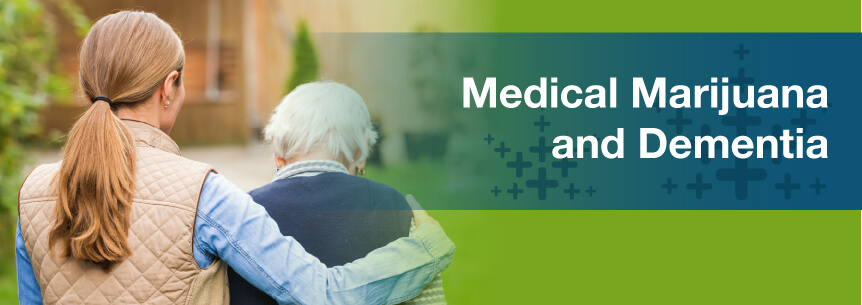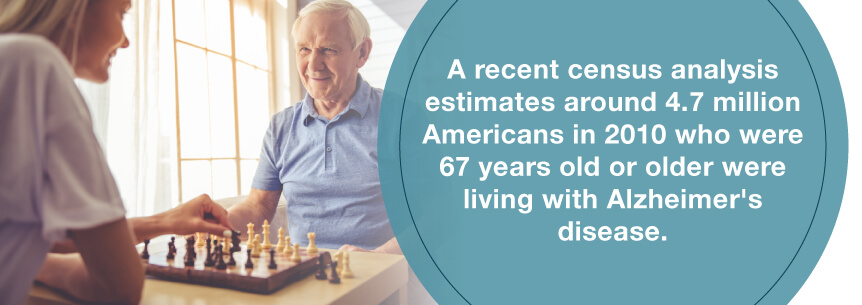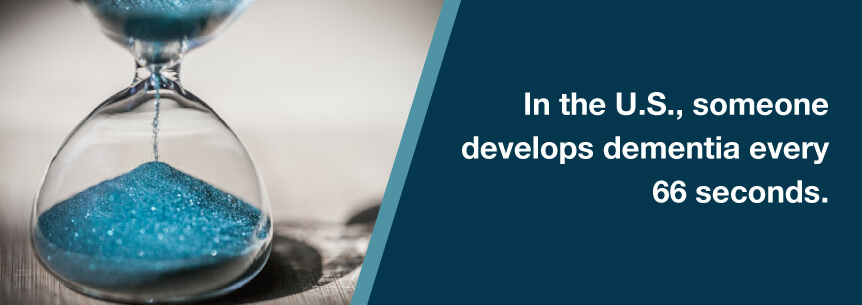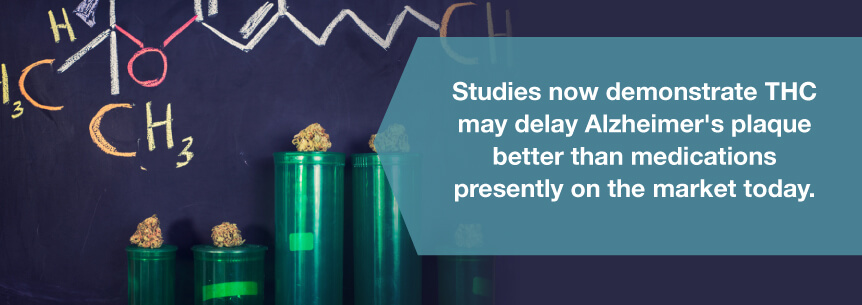
As a greater number of states begin to legalize medical marijuana use for qualifying conditions, more families are seriously considering the benefits this powerful herb offers to treat their elderly family members who are starting to show cognitive decline. If you’re taking care of a loved one with dementia, you know it’s not easy.
You may be wondering if you can make their suffering more bearable with the use of medical marijuana for dementia. This cannabis and dementia guide can help answer that question.
Dementia isn’t necessarily a disease on its own, but rather, it’s a collective term describing multiple cognitive decline symptoms like memory loss, thinking and communication. Dementia is a symptom of various brain disorders and diseases.
While not related specifically to aging, the chances of you or a loved one having dementia do increase with age.
A recent census analysis estimates around 4.7 million Americans in 2010 who were 67 years old or older were living with Alzheimer’s disease, which is a type and most common form of dementia.

Estimates by the Alzheimer’s Association show:
Dementia causes issues with memory, thinking and reasoning. It occurs when parts of your brain used for memory, language, learning and decision-making are diseased or damaged. Treatment may improve dementia symptoms, but there’s no cure for most diseases causing dementia.
You can separate dementia into two main groups based on the affected parts of the brain.
These occur due to problems in the outer layers of the brain (cerebral cortex). They’re fundamental to language and memory. Individuals with these forms of dementia generally can’t understand language, can’t remember words and have severe memory loss. Creutzfeldt-Jakob and Alzheimer’s disease are a couple of types of cortical dementia.
These occur due to issues in brain parts underneath the cortex. Individuals with these dementias often display changes in their ability to begin activities and in their speed of thinking. Usually, those with subcortical dementia don’t struggle with language problems or forgetfulness. Huntington’s disease, Parkinson’s disease and HIV may cause subcortical dementias.
Egyptian psychiatrists back in 2000 BC were the first to document the concept of dementia, but the disease got its name in 1797. The word dementia derives from Latin and means “out of one’s mind.” Philippe Pinel, a French psychiatrist, was the first to coin the term.
Recently, how we understand the pathogenesis, epidemiology and diagnosis of dementia, Alzheimer’s disease and other related disorders have advanced considerably. Researchers are carefully scrutinizing the nosology of disorders like these today. Also, therapeutic agents made specifically for enhancing cognition and memory in Alzheimer’s patients is evolving.
Individuals with dementia often show the below-listed symptoms, typically due to loss of memory. Patients may notice some signs on their own, while the healthcare workers or caregivers see many clues.
Symptoms include:
Most patients’ dementias progress where their symptoms begin slowly and get worse with time. If you notice problems with memory in yourself or a loved one or changes in thinking skills, you shouldn’t ignore these signs. These clues could indicate a treatable condition where professional evaluation is needed. They also could indicate dementia, and receiving an early diagnosis means treatment may be more effective. You’ll also have more time to plan ahead.
Dementia patients may experience certain effects in various areas like:
Depression, apathy and anxiety are also common in people with dementia, which can affect their mental and emotional health.
Individuals with dementia tend to get depression more than others, especially those with Parkinson’s disease dementia or vascular dementia. There’s a nine to 68 percent prevalence rate of depression in dementia cases. While depression can set in at any stage of dementia, doctors typically diagnose it in the earlier stages. Depression can also affect family members who are caring for their loved one with the disease.
It’s not uncommon for you to lose interest in something or lose your “drive” occasionally, but those with apathy have persistent lack of interest or loss of motivation to do things. Apathy is common in those with dementia and is different than depression.
Also common in dementia patients is anxiety, and it affects anywhere from five to 20 percent of people with the condition. Anxiety is also common in those with Parkinson’s disease dementia and vascular dementia, similar to depression. It can affect dementia patients at any stage of their disease.
Facts about the condition according to the Alzheimer’s Association include:

The World Health Organization estimates that:
Again, while you can’t cure most forms of dementia, you can manage the symptoms. Treatment options include:
Doctors often prescribe these drugs below to help improve symptoms of dementia temporarily:
These medications can have side effects, including diarrhea, nausea and vomiting.
Your physician may prescribe other types of medications that help treat other conditions or related symptoms like sleep disturbances, depression or agitation.
Your doctor may use non-drug approaches to treat behavior problems and dementia symptoms like:
Behavior problems and dementia symptoms will get worse with time. As a caregiver, you may want to try these recommendations:
A dementia diagnosis can be distressing. It’s a progressive and unpredictable condition you need to prepare yourself and those around you for.
There’s been an association between cannabis and memory problems for quite some time. Therefore, it’s only natural you’d be a little concerned with potential side effects it may cause to your loved one when using it to treat their cognitive decline.
Although it’s true marijuana can bring on short-term memory loss — you forget things at the moment when the herb is active in your system — the only long-term memory loss issues its demonstrated has been in those who use the herb regularly over a span of several years. Studies now demonstrate THC may delay Alzheimer’s plaque better than medications presently on the market today.

The endocannabinoid system is gaining a lot of research interest in its role as a possible target for Alzheimer’s disease treatment. Research is showing certain cannabis components like THC seem to eliminate Alzheimer’s amyloid clumps from lab-grown nerve cells. In fact, in one study, researchers gave mice with Alzheimer’s symptoms a CBD and THC combo. Results of this experiment showed fewer amyloid clumps in the mice’s bodies and improved learning.
Certain drugs help with symptoms of dementia like confusion and memory loss to a certain extent. These drugs include:
The problem is, they also come with horrible side effects that can affect the entire body. For instance, a lot of these drugs act similar to insecticides and nerve agents, and they can cause side effects like:
Additionally, these current Alzheimer’s medications don’t stop or reverse the progression of the disease which led researchers in search of newer, more effective alternatives.
In their search, they conducted various studies on cannabinoid therapy. It appears medical cannabis for dementia does what the more popular pharmaceutical drugs can’t — repair, recover and heal the nervous system and brain parts the progression of the disease severely affects.
In lower doses and when closely monitored by a medical professional, medical marijuana therapy appears to be free of any harsh and damaging side effects that often occur with the strong pharmaceutical drugs.
Furthermore, researchers also noted a substantial reduction in psychological and behavioral dementia symptoms including:

Caregivers of dementia patients also struggle with emotional and physical burdens, and when given cannabis oil with THC, it significantly reduces their stress as well, according to the studies.
Both indica and sativa marijuana strains can help those with cognitive decline. Indica strains help patients get good quality sleep without waking up in the morning feeling drowsy. Sativa strains help medicate them during the day while keeping them uplifted and active.
Below are some recommended strains for treating dementia:
NYC Diesel is high in THC content, but it still delivers an energetic effect that awakens and stimulates your mind. It’s a useful strain for patients who appreciate creative pursuits like arts and crafts, outdoor activities and other fun adventures.
White Russian is high in THC and is very therapeutic for those struggling with cognitive decline. It makes a good daytime medication due to its strong sativa properties, but also helps you get the sleep you need at night when you smoke it. Dementia patients also use it for pain, stress, depression and appetite loss.
This strain is typically used for pain, stress and depression because of its uplifting effects. It’s also a helpful strain for Alzheimer’s since it has a positive effect on mood swings.
This is a stress-alleviating strain that also treats insomnia, depression, pain, muscle spasms and anxiety.
Skunk No. 1 helps with insomnia, depression, headaches, stress, pain and inflammation-related conditions. It’s a perfect strain if you or your loved one are depressed, moody or fatigued resulting from either Alzheimer’s or dementia. It has uplifting properties and makes you feel euphoric and happy while calming you down.
There are multiple ways to consume marijuana for dementia therapy, including:
Smoking marijuana tends to act stronger and faster, whereas ingesting the herb takes a bit to set in and lasts longer. Edibles can come in the form of cookies, candies, butter and foods. If smoking it works better, there are various smoking apparatuses to try out. You’ll just need to experiment to figure out which cannabis and dementia treatment method works best for you or your loved one.
Your first step is to conduct research and see if your state has medical cannabis laws in effect. If you find out your state does support medical weed, you can search for a medical marijuana dispensary or doctor.
Here is some additional information on qualifying states:
You might have to set up an appointment with one or more physicians to confirm your diagnosis to receive your marijuana and dementia treatment prescription. These physicians can help you decide the best strain for you or your loved one depending on the specific situation since different cannabis types are bred to provide various therapeutic effects. Begin by searching for a medical marijuana doctor.
Find A Doctor Find A Dispensary